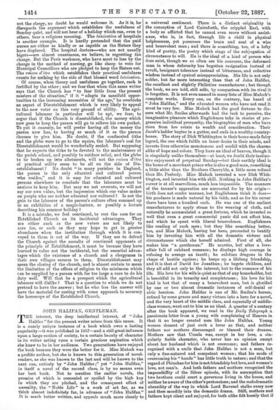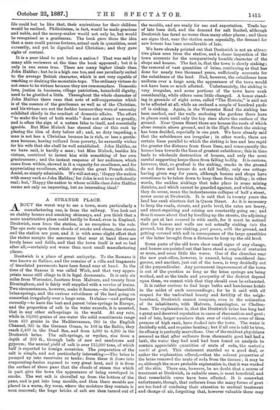JOHN HALIFAX, GENTLEMAN.
TEE interest, the deep intellectual interest, of "John Halifax " for the present writer arises from this cause. It is a nearly unique instance of a book which owes a lasting popularity—it was published in 1857—and a still great inflnence upon a large section of society, to a certain beauty of character in its writer acting upon a certain gracious aspiration which she knew to be in her audience. Two generations have enjoyed the book because they were the better for it. Miss Mulock was a prolific author, bat she is known to this generation of novel- readers, as she was known to the last and will be known to the next one, entirely by "John Halifax ;" yet "John Halifax," in itself a novel of the second class, is by no means even her best book. Not to mention the earlier novels, the promise of which is concealed or spoiled by the high key in. which they are pitched, and the consequent effect of unreality, the "Noble Life" ie a work of art far, as we think almost indefinitely far, in advance of "John Halifax." It is much better written, and appeals much more closely to a universal sentiment. There is a distinct originality in the conception of Lord Cairnforth, the crippled Earl, with a body so afflicted that he cannot even move without assist. ance, who is, in fact, through life a child in physical helplessness, yet possesses the brain and soul of a wise and benevolent man ; and there is something, too, of a lofty kind of poetry, the poetry which sings of the subjugation of circumstance to will. He is the ideal of a kind of person who does exist, though we so often see his converse, the deformed man in whom deformity has begotten resignation instead of revolt, benignant tolerance instead of bitterness, and reflective wisdom instead of cynical misappreciation. His life is not only nobler, but far more interesting than that of John Halifax, the excellent and slightly Philistine manufacturer ; but though the book, we are told, still sells, by comparison with its rival it is forgotten. It is not even named in many lists of Miss Mnlock's complete works. Every one, on the contrary, has heard of " John Halifax," and the educated women who have not read it must be very few. Miss Maio& had the good fortune to dis- cern what Mr. Smiles afterwards had the luck to perceive, the imaginative pleasure which Englishmen take in stories of pro- gressive individual prosperity, the biographies of men who have risen from low estate to wealth and consideration. Their Jacob's ladder begins in a gutter, and ends in a wealthy country- house. The story of Dick Whittington is their home-made fairy legend, the one which fulfils an inner desire in their minds, and invests lives otherwise monotonous and sordid with the charms alike of hope and colour. They have an ideal of heaven, though it is singularly unlike themselves—at least, we doubt their instinc- tive enjoyment of perpetual Sunday—but their earthly ideal is the home of a merchant prince who is also a good man, something a little abler than the Brothers Cheeryble, a little more refined than Mr. Peabody. Miss Mulock invented a new Dick Whit- tington, and invented him with skill. Nothing in John Halifax's career is at all marvellous, much less impossible. The manners of the tanner's apprentice are accounted for by his origin— birth does not confer manner, but Englishmen think it does— his goodness is made natural by his faith, and as for his career there have been a hundred such. He was one of the earliest manufacturers to apply steam to the wearing of cloth, and naturally he accumulated a great fortune, which he invested so well that even a great commercial panic did not affect him, and which he spent with liberal benevolence. Englishmen like reading of such men; but they like something better, too, and Miss Mulock, 'haring her hero, proceeded to beatify him by investing him with all the domestic virtues and circumstances which she herself admired. First of all, she makes him "a gentleman." He marries, but after a love- affair full of subdued romance ; he displays high courage in refusing to avenge an insult ; he subdues dragons in the shape of hostile squires ; he keeps up a lifelong friendship, and it is that of David for Jonathan ; he begets children, and they all add not only to the interest, but to the romance of his life. His love for his wife is quiet as that of any householder, but is beautiful in its tenacity and completeness ; his love for his kind is but that of many a benevolent man, but is glorified by one or two almost dramatic instances of self-denial or civic heroism. John Halifax is one of Mr. Smiles's heroes, refined by some graces and many virtues into a hero for a novel, and the very heart of the middle class, and especially of middle- class women, went out to him as an ideal. A quarter of a century after the book appeared, we read in the Daily Telegraph a passionate letter from a young wife complaining of Heaven in that it no longer created men like John Halifax. Young women dreamt of just such a lover as that, and neither fathers nor mothers discouraged or blamed their dreams. Mothers saw that 'Urania was, except in her love, a sin- gularly feeble character, who never has an opinion except about her husband which is not overcome ; and fathers re- cognised with a smile that John Halifax is not a man, but only a fine-natured and competent woman; that his mode of overcoming his " hands " has little truth to nature ; and that the regard of Phinehas for him is not friendship but love, and woman's love, not man's. And both fathers and mothers recognised the impossibility of the Silver episode, with its assumption that two brothers could court a governess living in the house, and neither be aware of the other's pretensions; and the melodramatic absurdity- of the way in which Lord Ravenel stalks every now and then moodily into the domestic drama. Still, mothers and fathers kept silent and enjoyed, for both alike felt keenly that if
life could but be like that, their aspirations for their children would be realised. Philistinism, in fact, would be made gracious and noble, and the money-maker would not only be, but would be recognised as a gentleman. The book gave them the idea that a man could pursue fortune, actual cash in quantities, most earnestly, and yet be dignified and Christian ; and they gave sighs of content.
It is a poor ideal to put before a nation P That was said by many able reviewers at the time the book appeared ; but it is only in one sense true. There are many higher ideals than John Halifax ; but he is a high one too, and one peculiarly suited to the average British character, which is not very capable of reaching or desiring the mountain-tops. The ordinary virtues do not cease to be virtues because they are commonplace. Domestic love, justice in business, village patriotism, household dignity, need to be glorified a little. Throughout the whole character of John Halifax there runs that note of self-suppression which is of the essence of the gentleman as well as of the Christian, and his virtues are not the feebler because they were of necessity exhibited chiefly in the conduct of domestic affairs. The effort "to make the best of both worlds" does not attract us greatly, and is often the sign of a nature false to itself, and essentially ignoble. But Miss Ifulock has steered clear of this rock by placing the idea of duty before all ; and, no duty impeding, a man is not less a Christian because he is rich, or less a gentle- man because, having suffered from poverty, he earnestly wishes for his wife that she shall be well established. John Halifax, as we have said, is hardly a man ; but Miss Mulock, besides his virtues, contrived to invest him with something of her own graciousness ; and the instant response of her audience, which came from within, showed in it a capacity for excellence, and for appreciating excellence, which struck the great French critic, Amiel, as simply admirable. We will not say, 'Happy the nation with many such as John Halifax,' for John is not to ns sufficiently real; but, ' Happy the nation to whose middle class John Halifax seems not only an improving, but an interesting ideal.'







































 Previous page
Previous page